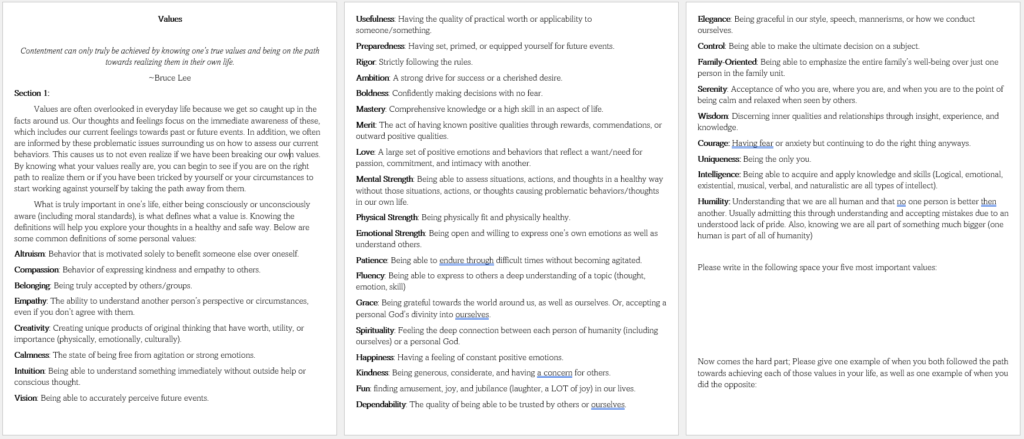
Values Freed
Values buried, dusted gray,
Tucked beneath the load of day,
Edges worn, but still they gleam,
Ghosts of an old, forgotten dream.
Through years of silence, dimmed and blurred,
They waited there, unheard, unstirred,
Quiet as roots beneath the soil,
Humbled by life’s endless toil.
One evening’s hush, a spark of light,
A memory glows, faint yet bright—
A hint, a glimpse, a knowing glance,
Of meaning lost, now given chance.
Through tangled weeds and overgrown,
A path reclaims what once was known,
The pulse of something true and clear,
A compass drawn by heart held near.
The threads renew, unwinding slow,
Old roots stretch deep, begin to grow,
Forgotten no more, their colors bold,
In warmth of hand and quiet hold.
Values rising, soft and free,
Found again, their place to be,
As steady lights that guide and cast,
The life reclaimed, the shadows past.
Dr. Tranquil
Exploring Values Through a Spiritual and Personal Lens
Values are the foundation of our lives, guiding the choices we make, the relationships we build, and how we respond to life’s challenges. They are more than just beliefs; they are deeply held convictions that define who we are and who we strive to become. Living by our values allows us to navigate life with clarity and purpose, helping us stay grounded through both peaceful and turbulent times.
Values act as an internal compass. When we understand what truly matters to us, we are less likely to be swayed by external influences or situations that don’t align with our principles. Our values empower us to make choices that reflect who we are, even when we face pressure to conform. Embracing our values can lead us to greater resilience and a stronger sense of direction, allowing us to approach life with both purpose and strength.
The journey to discovering values is personal and meaningful. Values are often shaped by the background we come from, our unique life experiences, and the beliefs we hold about ourselves and the world. For many, spirituality also provides a grounding foundation for values, while for others, values emerge through interactions, reflections, and lessons learned. No matter where they come from, values guide us in making choices that are authentic and true to ourselves.
Reflection on the Origins of Values
Values don’t form in isolation; they are shaped by a blend of influences that contribute to who we are today. Some values are inherited through family, culture, and community, while others evolve as we encounter challenges, make decisions, and learn from our experiences. Concepts like kindness, honesty, or respect may seem universal, yet each person’s interpretation is unique based on what these values mean to them personally. For instance, one person might see kindness as a way of supporting others, while another may view it as treating themselves with care and self-respect.
Values are often influenced by the society around us. Cultural expectations and societal beliefs introduce us to certain values early in life, shaping what we see as “good” or “important.” As we grow, we have the opportunity to either embrace these values as our own or question and redefine them based on personal beliefs. Recognizing where our values originate can provide valuable insights into which principles resonate authentically with us and which may have been adopted without reflection.
As you embark on this journey, think about the values that resonate most with you. Are they rooted in family traditions, personal experiences, or perhaps challenges you’ve overcome? Are there values you’ve held for as long as you can remember, or do you feel that certain values are emerging as you grow? Reflecting on these questions helps reveal the principles that guide your life, offering a sense of clarity and self-awareness.
A Personal Invitation to Discover Your Values
Identifying your values is a process of self-discovery that moves from general ideas to a deeper understanding of what is personally meaningful. Values are like threads weaving through our lives, shaping our actions, influencing our decisions, and impacting the way we build relationships. When we act in alignment with our values, we often feel a greater sense of purpose and fulfillment. On the other hand, when our actions go against our values, we may experience inner conflict, frustration, or even regret.
The journey of discovering values involves finding what resonates deeply within. Perhaps you value honesty because it builds trust in relationships, or maybe creativity is important because it allows you to express yourself fully. Reflecting on these values connects you with your core self, bringing clarity to what motivates and drives you.
Values are not fixed; they evolve as we grow. What may have been important in the past can shift as we encounter new experiences and gain fresh perspectives. Embracing this evolution allows us to remain true to our changing selves, continually adapting to reflect our current beliefs and aspirations. The process of self-reflection and growth is ongoing, helping us understand more about ourselves and the world around us.
Recognizing the Purpose of Values
Values are not just preferences; they add structure, purpose, and meaning to our lives. When we commit to living by our values, we commit to a certain way of being. Values like integrity, compassion, and resilience empower us to make choices that reflect our inner beliefs, guiding us to face challenges with strength and authenticity. They serve as anchors, holding us steady even when life feels uncertain.
Values also provide resilience. When faced with difficult choices or external pressures, values help us remain grounded, reminding us of who we are and what we stand for. For example, if you value honesty, it becomes easier to make tough decisions, even if they are unpopular or challenging. Knowing that you are acting in line with your values can provide comfort and confidence, assuring you that you’re living authentically.
Living by our values also leads to a sense of fulfillment and purpose. Choosing to act with integrity, kindness, or perseverance brings meaning into our lives, creating deeper connections and building trust with others. By staying connected to our values, we cultivate a supportive environment that reflects the principles we hold dear, enriching our own well-being and positively influencing those around us.
Moving Forward with Clarity and Purpose
As we continue this journey, we will gradually move from broad ideas to identifying the values that resonate with each of us on a personal level. This process is about finding clarity and developing a framework to guide us through life’s ups and downs. When we know our values, we can make decisions that align with our beliefs, leading a life that feels purposeful and true to who we are.
Values are deeply personal, shaped by our unique experiences and insights. Taking the time to reflect on what matters most allows us to better understand ourselves and live with authenticity. This journey is about creating a life that reflects our core beliefs, empowering us to make decisions that are rooted in who we truly are, rather than in what others expect of us.
Let this exploration of values be a journey of self-discovery and growth. Values help us live with integrity, make meaningful connections, and approach challenges with resilience. Staying connected to our values allows us to create a life that is true to ourselves, bringing greater depth and meaning to every moment. Through this journey, may you find clarity and strength to live in alignment with the values that matter most.

VALUESTRUE
Visions held close, like a secret kept,
A patient dream through years that slept.
Lifting eyes to endless skies,
Under a world where freedom lies.
Every fiber of will and grace,
Sewn into plans that took their place.
Tethered once, now let it soar,
Rising above, he finds the core.
Unbound, fulfilled in colors bright,
Elevated by values, taking flight.
Dr. Tranquil
Common Traps in Living by Our Values
As we set out to live by our values, we quickly realize that it’s not always easy. Life has a way of presenting obstacles that can pull us away from what we know to be true and important. These obstacles, or “traps,” often appear subtly, creating excuses, rationalizations, or justifications that make it hard to stay aligned with our values. Recognizing these traps is essential to maintaining focus on what matters most.
The first trap we encounter is comfort. Comfort, though often harmless, can become a powerful distraction from growth. When we feel comfortable, we’re often less likely to challenge ourselves or confront difficult situations. For example, if someone values honesty but feels it’s easier to keep the peace by staying silent, they may avoid speaking up to maintain a sense of ease. Over time, choosing comfort over honesty can lead to a disconnection from their true values, creating a tension that eventually impacts well-being and self-respect. To overcome this, it’s important to remember that growth often requires stepping out of our comfort zones and embracing the discomfort that comes with staying true to our values.
Another common trap is what we might call little lies. These are the small, seemingly harmless untruths we tell ourselves or accept from others. Over time, they accumulate, gradually clouding our sense of reality and self-worth. We may start believing statements like “I’m not good enough” or “I don’t deserve happiness,” even if these ideas are far from the truth. These little lies begin to shape how we view ourselves, eroding confidence and limiting our ability to pursue our values wholeheartedly. Recognizing these internalized beliefs as untruths is the first step to overcoming them. Replacing negative self-talk with affirmations that align with our values can help dismantle these lies, allowing us to approach life with greater authenticity.
The third and perhaps most pervasive trap is learned helplessness. This term describes a mental state in which someone feels they have no control over a situation, even when change is possible. Learned helplessness often develops from repeated experiences of feeling powerless, and it can make us hesitant to pursue our values, believing that our efforts won’t make a difference. Imagine someone who deeply values personal growth but feels that past failures have made it impossible to succeed. They may stop trying altogether, resigning themselves to a life that doesn’t reflect their true potential. Recognizing learned helplessness as a pattern rather than a truth can be liberating. Each small step taken toward change, even if it’s challenging, builds resilience and gradually rewires our beliefs about what is possible.
Building Awareness of Traps
Recognizing these traps and understanding how they manifest in our lives is a crucial part of staying connected to our values. Often, these traps operate quietly, without our full awareness. For example, we may not realize how much we’ve sacrificed our values for the comfort of avoiding conflict, or how much we’ve internalized others’ negative perceptions of us. Taking time for regular self-reflection, journaling, or discussing these experiences with a trusted friend or mentor can bring these traps to light, allowing us to address them head-on.
Each trap is a challenge, but also an opportunity. When we identify where we tend to slip up, we become better equipped to steer ourselves back on course. Developing strategies for each trap can be helpful. For comfort, we might remind ourselves that discomfort is a temporary state, while the benefits of living by our values are long-lasting. For little lies, we can practice questioning negative beliefs and replacing them with more empowering thoughts. And for learned helplessness, we can start small, setting achievable goals to rebuild our sense of agency and ability to impact our lives.
Learning from These Traps
These traps remind us of the strength it takes to live by our values and the potential consequences when we don’t. It’s not about being perfect or never making mistakes; rather, it’s about learning and adjusting our course as needed. By understanding these traps, we gain insight into our patterns and habits, which ultimately makes it easier to stay true to ourselves. Values are deeply personal, and living by them is a journey that requires patience, commitment, and a willingness to learn from setbacks.
Values are only as powerful as our commitment to live by them, even in the face of obstacles. Each time we identify and overcome a trap, we strengthen our connection to what truly matters, building resilience and self-trust. Living by our values is a continuous practice, shaped by awareness and small, intentional choices. Recognizing traps for what they are allows us to keep moving forward, grounded in our commitment to live a life that is true to who we are.

Choice
Laughter danced on sunlit trails,
I wandered freely, caught the sails
Of breezes warm and skies so bright,
Unaware of webs in sight.
A careless step, a gentle breeze,
And there it clung with eerie ease—
A spider’s web, unseen and thin,
Where light once led, now shadows spin.
At first, I laughed—how small, how slight!
Just brush it off, I’ll be alright.
But every path led back to threads,
A sticky maze of silken threads.
It wrapped around in subtle ways,
Binding steps, dimming days,
Each time I pulled, the strands would hold,
Till freedom’s light felt dim and cold.
Then one quiet, steady breath,
I stilled my fight, unspooled my depth,
Looked beyond, saw paths anew—
Where no webs stretched, where skies were blue.
With careful steps, I slipped aside,
Found clearer paths, with space to glide,
Laughter rose, but wiser yet,
Freed from webs I won’t forget.
Dr. Tranquil
Psychology Experiments: The Influence of Social Pressure on Personal Values
Understanding how easily we can be influenced away from our values is an essential part of staying grounded. Many famous psychology experiments reveal just how powerful social pressure, authority, and environment can be in shaping our actions, even when those actions go against our beliefs. These studies highlight the importance of being aware of the subtle forces around us that may steer us away from our personal values. Reflecting on these findings allows us to become more conscious of our decisions, reinforcing our commitment to live according to our beliefs, even in challenging situations.
One well-known study, the Asch Conformity Experiment, demonstrates the power of group influence. In this experiment, participants were shown a series of lines and asked which lines matched in length. What they didn’t know was that the other people in the room were actors instructed to purposely give incorrect answers. The real participants, surrounded by people confidently giving the wrong answer, often found themselves doubting their own judgment. Despite knowing the correct answer, about 75% of participants conformed at least once, choosing the group’s incorrect answer over their own accurate perception.
This experiment highlights a common challenge we all face: the pressure to conform to others’ beliefs or actions, even when they conflict with our values. Think about how this might apply to everyday situations. How often have we gone along with something that didn’t feel right just to fit in or avoid conflict? Recognizing the influence of social pressure can empower us to pause, reflect, and choose actions that align with our values instead of simply following the crowd. This awareness is crucial for maintaining integrity, especially in moments when going against the grain feels difficult.
Another experiment, the Milgram Obedience Study, shows the extent to which people will follow authority, even when it means violating their own moral beliefs. In this study, participants were asked to administer electric shocks to another person each time they answered a question incorrectly, with the shocks becoming progressively more intense. Though the “shocks” were fake and the person receiving them was an actor, the participants didn’t know this. Under the authority of the experimenter, many participants continued to administer shocks, even when they believed they were causing significant pain.
This study underscores the powerful influence of authority figures on our actions. It can be easy to let the perceived authority of others—whether bosses, mentors, or societal leaders—override our inner convictions. Situations like these call us to remember that no external authority should compromise our personal values. When faced with decisions, it’s essential to question whether the actions we’re being asked to take align with our beliefs. By doing so, we ensure that our values remain the guiding force behind our choices, not the expectations of others.
The final experiment we’ll explore is the Rat Park Study, which offers insight into how environment affects behavior and values. The original study placed rats in isolated cages with access to two types of water: one plain and one laced with a drug. The rats in isolation tended to consume the drug-laced water excessively, sometimes to the point of overdose. However, when the experiment was modified to place rats in a stimulating, social environment filled with toys, other rats, and ample space—what was termed “Rat Park”—the rats were significantly less likely to consume the drug-laced water.
This experiment reveals how environment and fulfillment can impact our choices and values. When we feel isolated or deprived, we may turn to habits or behaviors that provide temporary relief but don’t align with our true values. Conversely, a supportive, enriching environment can lead us toward choices that reflect our authentic selves. In our own lives, creating an environment that aligns with our values—whether through supportive relationships, meaningful activities, or positive surroundings—can help us avoid the pitfalls of destructive behaviors.
Learning from Social Influence
These experiments show us that we are often more susceptible to external influences than we might like to admit. But awareness of this tendency allows us to build resilience against it. Reflecting on these studies reminds us to stay connected to our values, even when we feel pressure from those around us. Each time we recognize the forces at play, we empower ourselves to make decisions based on what we believe is right, rather than simply going along with others.
By staying mindful of social pressures, authority, and environmental influences, we reinforce our commitment to live by our values. This awareness helps us make conscious choices, ensuring that our actions reflect our inner beliefs rather than external expectations. Living by our values is a practice of courage and self-trust, one that allows us to lead lives of integrity and authenticity, regardless of the influence of the world around us.
Reflection and Practical Exercise: Identifying Your Core Values
Having explored what values are, where they come from, and the challenges we face in staying true to them, we now move to the heart of this journey: discovering your personal core values. This section invites you to take a deeper look at the values that resonate with you and form the foundation of who you are. Identifying these values provides a compass to guide you through life’s decisions, helping you make choices that align with your true self.
Values are deeply personal, and understanding them is a process of uncovering layers. This exercise isn’t about defining yourself in strict terms but about recognizing the principles that bring you closer to living a meaningful life. By clarifying your values, you’ll gain insight into what truly matters to you and how these values can guide you through challenges, opportunities, and relationships.
Handout
As you begin the journey of identifying your own core values, take a moment to reflect on the ideas we’ve explored. Values are not only the beliefs we hold close but are also the foundation of the choices we make and the paths we walk. This next step is about making these values tangible, bringing them from thought into action. The following handout is designed to help you dive deeper into this exploration. It offers prompts and exercises that will guide you in discovering the values that resonate most with you and help clarify how they shape your life.
By taking time with this handout, you’ll gain a clearer understanding of what drives you, what gives you purpose, and what principles define who you are. Use this as a tool to reconnect with what matters, align your goals with your values, and create a foundation for making decisions that truly reflect your inner self. Let this be a meaningful first step in living with intention and clarity.


Begin with Broad Ideas and Narrow Them Down
Start by considering general values that feel significant to you. Think about concepts like integrity, kindness, resilience, loyalty, creativity, compassion, or growth. These are broad values that many people hold, but each individual interprets them differently. For example, if you choose “kindness,” consider what this looks like in your daily life. Do you see kindness as giving support to others, as practicing self-compassion, or as working toward a cause you believe in?
Take a moment to reflect on the values that initially come to mind. Which of these feel central to who you are? Which ones guide your behavior, impact your relationships, or provide comfort in difficult times? Remember, there are no “right” or “wrong” values here—only what resonates with you personally. Identifying your core values is about exploring what makes you feel most connected to your authentic self.
Explore the Values That Have Shaped Your Life
Reflect on experiences that have been particularly meaningful or challenging for you. Often, the moments that stand out in our memories reveal insights about our values. Consider times when you felt proud, fulfilled, or fully alive. What qualities or actions were present in those moments? Conversely, think about times when you felt conflicted, disappointed, or untrue to yourself. Which values might have been compromised or missing?
Our experiences often highlight the values that matter most. For example, if you felt proud after standing up for someone, “courage” or “justice” might be core values for you. If a time of isolation felt deeply uncomfortable, it could suggest that “connection” or “community” is a priority. Looking back at these experiences helps reveal patterns and themes that point to your values.
Challenge Yourself to Distill and Define Your Values
Once you have a list of potential values, challenge yourself to distill them down to a few that feel most central to who you are. This doesn’t mean discarding others but rather focusing on the values that are essential to your life’s purpose and direction. Distilling your values helps you create a clearer picture of what guides you.
To define each value more specifically, ask yourself: What does this value mean to me? How do I live out this value in my everyday life? How does it influence my choices, relationships, and goals? For example, if you identify “integrity” as a core value, you might define it as “honoring my word, being honest with others, and aligning my actions with my beliefs.” Defining values in personal terms helps make them actionable and easier to integrate into daily decisions.
Putting Values Into Practice: A Daily Commitment
Identifying values is only the beginning; the real journey lies in actively incorporating them into your life. Consider ways to bring your values into daily practice. For instance, if “gratitude” is a value, you might commit to a simple daily ritual of expressing thanks, whether in a journal or through a quick mental note. If “growth” is a value, you might dedicate time each week to learning something new or challenging yourself.
Living by your values doesn’t require grand gestures—it’s often the small, consistent actions that make the biggest difference. Every decision, big or small, is an opportunity to act in alignment with your values, reinforcing your commitment to what matters most. Over time, these actions help build a life that feels authentic and fulfilling, grounded in principles that resonate deeply with you.
Reflecting on Values Over Time
Values aren’t static; they can evolve as we grow and change. Periodically reflecting on your values allows you to stay connected with who you are and make adjustments as needed. Life experiences may reveal new priorities, while other values may take on deeper meanings over time. Revisiting your values regularly helps ensure that they continue to reflect your current beliefs and aspirations.
In taking this journey to discover your values, remember that it’s an ongoing process. Each step brings you closer to understanding yourself and aligning your life with what you truly care about. By knowing and honoring your values, you create a foundation for resilience, purpose, and personal fulfillment. This is about embracing who you are at the core and committing to live in a way that reflects your truest self.

Family Binds
Through open fields, the lone horse roamed,
With winds as friends, the wilds as home,
Yet something called from far away,
A pull that grew with each new day.
In search of more, it crossed the land,
Through rivers deep and desert sand,
Until a distant echo rang—
A soft and warm, familiar clang.
Then came the sight—a herd, a home,
Where once alone, it would now roam,
It found its place, no longer free,
But bound by love, in unity.
Dr. Tranquil
Embracing Values as a Path to Spiritual and Personal Fulfillment
As we conclude this journey through understanding, identifying, and living by our values, it’s clear that values are more than just guiding principles—they are bridges connecting us to a life of purpose, resilience, and integrity. They help us build a life that feels deeply meaningful and aligned with our true selves. Our values serve as an anchor, keeping us steady amid life’s uncertainties and grounding us in what matters most.
Values are not only a reflection of who we are; they are also a reflection of who we are becoming. Through the choices we make and the principles we hold, we shape ourselves and the world around us. In this sense, values are deeply spiritual—they encourage us to reach for something beyond ourselves, drawing us closer to a universal truth and inviting us to live with compassion, integrity, and love. Just as a compass points us toward a destination, values guide us toward becoming the people we are meant to be, connected to something greater than ourselves.
For many, spirituality and faith serve as a foundation for values, offering insights and teachings that shape our understanding of the world and our place within it. Spiritual traditions, particularly those found in sacred texts, encourage values such as love, kindness, humility, and forgiveness, which resonate across cultures and times. These values call us to honor both our own journeys and those of others, creating a life that reflects the beauty of interconnectedness and shared humanity.
Embracing values as a part of our spiritual journey invites us to live with intention and presence. It’s not about following rigid rules, but about recognizing the qualities that bring us closer to a life of purpose and fulfillment. Each value represents an opportunity to live in alignment with our beliefs, to act with kindness and empathy, and to contribute to a world that reflects our inner principles. When we live by values that are true to us, we find ourselves moving through life with a sense of peace, clarity, and connection.
Reflecting on Values as a Spiritual Practice
Living by our values can be seen as a form of spiritual practice, an ongoing commitment to align our actions with our beliefs. Each day presents opportunities to practice our values, to make choices that reflect our principles, and to deepen our connection to a life of meaning and purpose. By approaching values as a spiritual practice, we invite greater awareness and intention into our lives, grounding ourselves in a deeper sense of purpose and resilience.
Values also offer a pathway to God, if faith is part of one’s journey. They are ways of expressing our connection to a higher power, reflecting qualities like love, compassion, and understanding. When we act with kindness, we reflect the love that we believe flows from a divine source. When we choose integrity, we honor the teachings that call us to live truthfully and authentically. Values, in this sense, are not just personal—they are sacred commitments, guiding us to live in a way that honors both ourselves and the world around us.
As we take what we have learned about values and apply it to our lives, may we remember that values are a source of strength, guiding us through challenges and uplifting us in moments of doubt. They remind us that we are not alone on this journey and that each choice we make in alignment with our values brings us closer to a life of fulfillment, peace, and connection.
Whether we are grounded in faith, spirituality, or personal beliefs, values offer a roadmap for living authentically and meaningfully. They remind us of the beauty of living with intention and the power of acting with integrity. By embracing our values, we create a life that reflects our true selves, aligned with principles that bring us closer to our purpose, our community, and the world we wish to build.
May this journey through values inspire us to live fully, to honor what matters most, and to walk forward with courage, resilience, and grace.

Boundless Blue Dreams
Once a girl, small and bright, with laughter clear,
Lived in a world where voices pressed near—
A chorus of wants, demands, and “shoulds,”
They shaped her life, as they thought they could.
“Be gentle, be kind, be all that we need,”
They wove her path, they planted the seed.
She grew in the shadow of others’ dreams,
In their woven stories, bound by their seams.
They painted her days, they whispered her part,
And slowly, their words wove into her heart.
“Be quiet, be still, don’t reach for the sky,
Stay grounded, stay close, don’t wonder why.”
Years passed by in a hushed, steady beat,
With smiles to wear and plans to meet.
She played their roles with a practiced grace,
Yet longed for peace in a different place.
In quiet moments, she’d feel a pull,
A whisper, a wish, elusive yet full—
To drift in the waters, clear and blue,
A world her own, vast and true.
But voices returned, with words like chains,
Bound by their needs, her own heart wanes.
She learned to nod, to smile, to obey,
And tucked her own dreams far away.
But as years passed on, and she grew in strength,
Her spirit grew weary of living at length
In borrowed dreams, in secondhand lights,
In days that felt like endless nights.
Until one dawn, a quiet broke through,
A soft, gentle voice, fragile but true.
It whispered, “Enough. There’s life to reclaim.
Your heart holds dreams, no longer in shame.”
With trembling hands, she took the step—
A promise to herself she finally kept.
She learned to say “no,” to carve her own way,
To lift her voice, let her spirit sway.
Down to the waters she found her path,
A sanctuary beyond others’ wrath.
She swam through currents, strong and vast,
Freed from the echoes of her past.
The water held her, clear and calm,
A balm for her soul, a steady psalm.
She drifted in peace, in silence deep,
In rhythms of life she was meant to keep.
For now, as she swam, she came to know,
The strength to stand, to let herself grow.
Her heart was her own, her dreams set free,
Alive in the depths of the boundless sea.
Dr. Tranquil
References
Affective Well-Being in Retirement: The Influence of Values, Money, and Health Across Three Years by Burr et al. (2011) – Link
Examines how personal values and financial health impact affective well-being in retirees over three years.
Affirmation of Personal Values Buffers Neuroendocrine and Psychological Stress Responses by Creswell et al. (2005) – Link
Demonstrates that affirming personal values reduces cortisol levels and psychological stress, particularly in individuals with strong self-resources.
Effect of Personal Values on Psychological Well-Being of Urban and Rural Youth by Gangopadhyay & Sikdar (2016) – Link
Compares the impact of personal values on the psychological well-being of urban and rural youth, showing distinct patterns based on location.
Longitudinal Association Between Adolescent Work Values and Mental Health and Well-Being in Adulthood by Fukasawa et al. (2020) – Link
Finds that work values developed in adolescence influence self-esteem and mental health outcomes in adulthood.
Mental Disorders in German Soldiers After Deployment – Impact of Personal Values and Resilience by Zimmermann et al. (2015) – Link
Investigates how values like tradition and self-direction relate to resilience and mental health in soldiers post-deployment.
Mental Health in Early Adulthood: Predictive Role of Growth and Self-Protection Values by Franczok Kuczmowska (2018) – Link
Explores how values like self-direction predict resilience and mental health in early adults.
Personal Values in Soldiers After Military Deployment: Associations with Mental Health and Resilience by Zimmermann et al. (2014) – Link
Examines correlations between personal values and PTSD in soldiers, highlighting values as a factor in resilience.
Personal Values, Trait Emotional Intelligence, and Mental Health Problems by Jacobs & Wollny (2021) – Link
Studies the relationship between personal values, emotional intelligence, and mental health outcomes, finding values linked to resilience.
Resilience and Mental Health Nursing: An Integrative Review of Updated Evidence by Bui et al. (2023) – Link
Reviews resilience-building strategies in mental health nursing, emphasizing personal values in professional well-being.
Resilience in the Health Professions: A Review of Recent Literature by McCann et al. (2013) – Link
Reviews literature on resilience in healthcare, discussing values as a factor in maintaining mental health under pressure.
Testing a Values-Based Approach to Healthcare Decision-Making in Older Adults by Geiger (2017) – Link
Assesses how values-based decision-making supports emotional well-being in healthcare contexts for older adults.
The Impact of the COVID-19 Pandemic on Subjective Mental Well-Being by Paredes et al. (2020) – Link
Examines how values and resilience moderated mental health impacts during the COVID-19 pandemic.
Toward a New Definition of Mental Health by Galderisi et al. (2015) – Link
Proposes an updated model of mental health incorporating positive emotions and personal values.
Understanding Culture, Resilience, and Mental Health: The Production of Hope by Panter-Brick & Eggerman (2012) – Link
Discusses cultural values as foundations for resilience and well-being in Afghan families facing adversity.
Understanding Psychological Flexibility: A Multimethod Exploration of Pursuing Valued Goals Despite Distress by Kashdan et al. (2020) – Link
Investigates how psychological flexibility in pursuing valued goals supports resilience and mental health.
Classic Experiments
The Asch Conformity Experiments
Solomon Asch’s series of experiments on conformity, originally published in Journal of Abnormal and Social Psychology in 1951, explored how individuals conform to group pressure.
Link to Original Paper: Asch, S. E. (1951). Effects of Group Pressure upon the Modification and Distortion of Judgments.
The Rat Park Experiment
Bruce Alexander’s “Rat Park” experiments in the late 1970s studied addiction and its environmental factors, suggesting that social and environmental context greatly influences addiction behavior.
Link to Original Paper: Alexander, B.K., Coambs, R.B., & Hadaway, P.F. (1978). The Effect of Housing and Gender on Morphine Self-Administration in Rats. Psychopharmacology, 58, 175–179.
The Milgram Obedience Experiment
Stanley Milgram’s 1963 study on obedience to authority, published in the Journal of Abnormal and Social Psychology, investigated the extent to which individuals obey authority figures, even when asked to perform morally questionable actions.
Link to Original Paper: Milgram, S. (1963). Behavioral Study of Obedience.
Prayers
Proverbs 4:23
“Above all else, guard your heart, for everything you do flows from it.”
Prayer: Lord, help me to guard my heart and fill it with values that align with Your will. May I protect what is precious within me and act with integrity and love in all I do. Amen.
Matthew 6:21
“For where your treasure is, there your heart will be also.”
Prayer: God, let my heart be focused on treasures that reflect Your truth. Guide me to place my values in what is eternal and meaningful, not in fleeting things. Amen.
Romans 12:2
“Do not conform to the pattern of this world, but be transformed by the renewing of your mind.”
Prayer: Father, renew my mind and help me resist conforming to values that don’t honor You. Shape me to reflect Your purpose and truth, and guide me in my own unique path. Amen.
Philippians 4:8
“Finally, brothers and sisters, whatever is true, whatever is noble, whatever is right, whatever is pure, whatever is lovely, whatever is admirable—if anything is excellent or praiseworthy—think about such things.”
Prayer: Lord, fill my thoughts with what is pure, noble, and praiseworthy. Help me align my values with these qualities and to seek what honors You and uplifts others. Amen.
Psalm 37:4
“Take delight in the Lord, and He will give you the desires of your heart.”
Prayer: Dear Lord, may my desires be a reflection of Your love and truth. Help me find joy in You so that my values and pursuits are centered in Your goodness. Amen.
Micah 6:8
“He has shown you, O mortal, what is good. And what does the Lord require of you? To act justly and to love mercy and to walk humbly with your God.”
Prayer: God, help me live out justice, mercy, and humility. May these values shape my actions and relationships as I strive to honor You each day. Amen.
Proverbs 3:5-6
“Trust in the Lord with all your heart and lean not on your own understanding; in all your ways submit to Him, and He will make your paths straight.”
Prayer: Father, I seek Your wisdom to guide my values and decisions. Teach me to trust You above all else, knowing that You will lead me in the right direction. Amen.
Matthew 5:16
“Let your light shine before others, that they may see your good deeds and glorify your Father in heaven.”
Prayer: Lord, may my life and actions reflect the values You have instilled in me. Let my choices bring light to others and glorify You in all I do. Amen.
Colossians 3:23
“Whatever you do, work at it with all your heart, as working for the Lord, not for human masters.”
Prayer: Dear God, help me dedicate all my efforts to You. May my values guide me to work with integrity, passion, and a heart that seeks to serve You above all. Amen.
Psalm 119:105
“Your word is a lamp for my feet, a light on my path.”
Prayer: Lord, let Your Word guide my values and illuminate my path. May Your truth be the foundation for my every decision, keeping me aligned with Your purpose. Amen.
Galatians 5:22-23
“But the fruit of the Spirit is love, joy, peace, forbearance, kindness, goodness, faithfulness, gentleness and self-control.”
Prayer: Holy Spirit, cultivate these fruits within me. Let my values reflect love, kindness, and self-control, and let my life be a testament to Your presence. Amen.
1 Corinthians 13:13
“And now these three remain: faith, hope, and love. But the greatest of these is love.”
Prayer: God, let love be the center of my values and actions. Guide me to live with faith and hope, but most of all with a love that mirrors Yours. Amen.
James 1:5
“If any of you lacks wisdom, you should ask God, who gives generously to all without finding fault, and it will be given to you.”
Prayer: Lord, I seek Your wisdom to shape my values and choices. Grant me understanding so that I may discern and live by what is right in Your sight. Amen.
Ephesians 4:1-2
“As a prisoner for the Lord, then, I urge you to live a life worthy of the calling you have received. Be completely humble and gentle; be patient, bearing with one another in love.”
Prayer: Father, let humility, gentleness, and patience be my guide as I live out the calling You have given me. Help me reflect these values in all my relationships. Amen.
Psalm 139:23-24
“Search me, God, and know my heart; test me and know my anxious thoughts. See if there is any offensive way in me, and lead me in the way everlasting.”
Prayer: Dear Lord, search my heart and refine my values. Lead me away from anything that does not serve You, and guide me in a path that brings me closer to Your everlasting truth. Amen.

